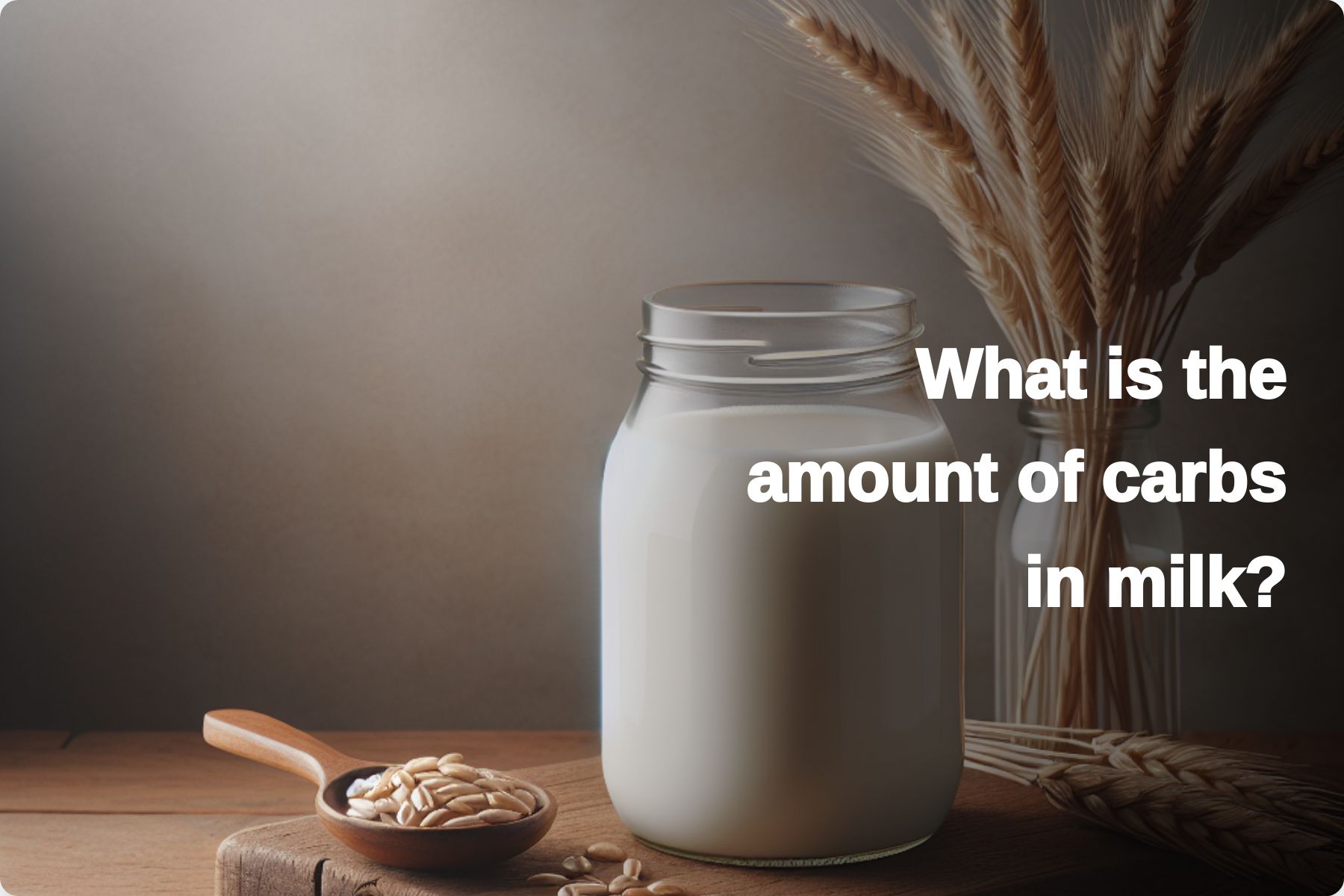
What is the amount of carbs in milk?
When it comes to knowing what's in the food we eat, it's important to understand how much carbohydrate is in milk. Carbs are often talked about when we discuss healthy eating, and milk is no exception. In this exploration, we'll look at why carbohydrates matter in milk and clear up some common misunderstandings.
You might wonder, "Does milk even have carbs?" The answer is a definite yes, but the type and amount can vary. As we go through this journey, we'll answer questions and simplify the assumptions about the carb content in milk. So, get ready to uncover the truth about the carbohydrates in your daily glass of dairy.

Counting Carbohydrates in Milk
Carbohydrates and key nutrients found in 1 cup (244 ml) of whole cow's milk:
Nutrient |
Amount per 1 cup (244 ml) |
Calories |
149 |
Total Fat (g) |
7.9 |
Saturated Fat (g) |
4.6 |
Cholesterol (mg) |
24 |
Sodium (mg) |
98 |
Total Carbohydrates (g) |
12.0 |
Dietary Fiber (g) |
0 |
Sugars (g) |
12.0 |
Protein (g) |
7.7 |
Calcium (mg) |
276 |
Vitamin D (IU) |
124 |
Vitamin A (IU) |
395 |
Potassium (mg) |
322 |
Vitamin B12 (µg) |
1.1 |
Phosphorus (mg) |
205 |
Types of Carbohydrates in Milk
-
Lactose:
The primary carbohydrate in milk.
A disaccharide composed of glucose and galactose.
Provides a source of energy.
-
Galactose:
A monosaccharide that is part of the lactose molecule.
Released upon the digestion of lactose.
-
Glucose:
Another monosaccharide that is part of the lactose molecule.
Also released upon the digestion of lactose.
-
Oligosaccharides (present in trace amounts):
Complex carbohydrates composed of a few sugar molecules.
May have prebiotic properties, supporting gut health.
Understanding the different types of carbohydrates in milk, especially the role of lactose, helps us see the nutritional value of this drink. It allows us to make informed choices based on our dietary needs and preferences. It's not just about the carbs; it's about knowing the specific sugars that make milk a wholesome choice.
Carb Content in Various Types of Milk
Type of Milk |
Total Carbohydrates (g) |
Sugars (g) |
|---|---|---|
Whole Milk (Cow) |
12.0 |
12.0 |
2% Milk (Cow) |
12.0 |
12.0 |
1% Milk (Cow) |
12.0 |
12.0 |
Skim Milk (Fat-Free, Cow) |
12.0 |
12.0 |
Almond Milk (Unsweetened) |
1.0 |
0 |
Soy Milk (Unsweetened) |
4.0 |
1.0 |
Oat Milk (Unsweetened) |
16.0 |
7.0 |
Coconut Milk (Unsweetened) |
2.0 |
1.0 |
Rice Milk (Unsweetened) |
22.0 |
13.0 |
Carbs in Milk: Myths and Facts
One prevalent misconception is that milk is a high-carb culprit, deterring those cautious of their carbohydrate intake. However, the reality is that the carb content in a standard cup of milk, around 12 grams, is a manageable portion, especially when considering the nutritional benefits it brings.
Another myth suggests that all milk alternatives are low in carbs. While it's true that almond milk tends to be lower in carbs, assumptions about other alternatives can be misleading. Soy milk, for instance, shares a similar carbohydrate content with whole milk, hovering around 12 grams per cup. It's crucial to scrutinize the nutritional labels and not generalize all alternative milks as universally low-carb options.
The notion that lactose-free milk is carb-free is also worth addressing. Lactose-free milk undergoes a process where the lactose is broken down, making it easier to digest for those with lactose intolerance. However, this process doesn't eliminate all carbohydrates. Lactose-free milk still contains the naturally occurring sugars found in milk, albeit in a more digestible form.
In essence, it's essential to base our understanding of milk's carb content on evidence-based information rather than succumbing to common misconceptions. The carb content in milk is not a hindrance but rather a part of the balanced nutrition it provides. By dispelling these myths, we empower ourselves to make informed choices that align with our dietary goals and preferences.

Busting the stigma surrounding milk
Our journey through the world of carbohydrates in milk has unveiled crucial insights for anyone mindful of their nutritional intake. Understanding that milk contains around 12 grams of carbohydrates per cup, primarily in the form of lactose, is key to making informed dietary choices.
Carbohydrates, often unfairly stigmatized, play a vital role in our energy supply and overall well-being. Milk, a nutritional powerhouse, offers a balanced combination of carbs, proteins, and fats. Whether you opt for whole, skim, or alternative milks, being aware of the variations in carbohydrate content allows you to tailor your choices to fit your dietary goals.
So, as you reach for that glass of milk, remember that it's not just a drink; it's a valuable source of nutrition. Cheers to making informed choices and savoring the goodness that milk, with its carbohydrates and all, brings to your table.
This Blog post is an initiative by Lo! Foods, to provide accurate and Nutritionist / Doctor approved information related to Health. Lo! Foods is India's leading brand for Everyday Functional Foods. Foods designed for specific Health conditions or Needs. Lo! Foods also runs India's largest range of Low Carb Healthy Cloud Kitchens, under the brand names of Lo!, ProteinChef, ATH (All Things Healthy) and DiabeSmart.















Leave a comment
Your email address will not be published.